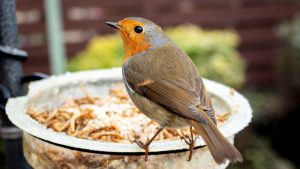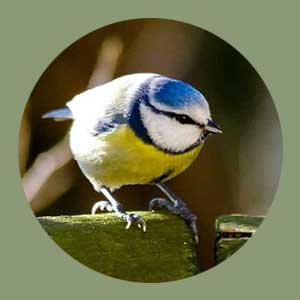Table of Contents
Which food should birds not eat?
Like me, so many people enjoy feeding the wild birds that visit our gardens. Pre-prepared seed mixes and suet balls are always a good idea, but isn’t it nice to give them the occasional treat from the kitchen?
Not all human food is safe for our feathered friends, so I decided to compile a list of which foods birds shouldn’t eat.
You might be shocked to find that some foods you previously gave to the birds provide absolutely no nutritional value to them.
Worse still, other foods such as some seeded fruits, roasting fats, and milk are actually harmful to birds.
When supplementing their diet, we should provide only the best foods that enhance and not inhibit the birds’ lives.

Which Foods are Harmful to Birds?
Salt
Salt is a rarity in much of the food birds eat in the wild. Like humans, they can only process limited amounts before it becomes harmful.
Too much sodium leads to excessive thirst, dehydration, kidney problems, and in the worst cases – death.
Even ‘healthy’ snacks contain high salt levels that upset the balance of electrolytes and fluid; avoid giving human cereal bars and seed snacks to the birds. Pretzels and potato chips might seem safe, but they contain lots of salt and untested chemicals.
Unsalted air-popped popcorn is a safer option.
Avocado
Avocado is a current favourite and possesses super-food powers. Sadly, they are completely opposite to the birds.
The leaves of the avocado produce a fatty acid called persin; it is toxic to birds. It acts as a fungicide and finds its way into the fruit.
Although it might not be present in all varieties of avocado, it is difficult for an untrained human to tell species apart. Play safe; steer clear of offering any avocado to the birds for fear of causing heart problems, respiratory illness, and death.
Caffeine
If you have ever drunk too much coffee, you might have felt your heart race and be unable to sleep.
Imagine that same effect on the tiny internal organs of wild birds.
Not only does caffeine cause hyperactivity and irregular heartbeat within our feathered friend, but it might also result in death.
Chocolate
Birds are tempted by chocolate almost as much as I am, but it is toxic for them.
Not only does it contain caffeine (we have already seen the harmful effects of that) it also contains theobromine. The side effects range from vomiting and diarrhoea to increased heart rate, tremors, and seizures.
Birds will appreciate a fruity, sugary snack just as much, maybe sliced grapes or mango. It’s a win-win situation; you get to eat all of the chocolate!
SOME Fruit Pits and Seeds
This isn’t quite as straightforward as it might be, and it is probably easier to make a list of which fruits are safe and those that aren’t.
Most fruits are a healthy, nutritious snack for the birds; only a few of those with pits or seeds are toxic due to the levels of cyanide compound within. Once they are removed, the fruit is perfectly safe for consumption.
Fruit that needs to have seeds removed; apples, pears, cherries, apricots, plums, nectarines, and peaches.
SAFE fruit without removing seeds or pits; citrus fruit, squash, pumpkin, pomegranate, melon, mango, berries, and tomatoes.
Onions and Garlic
Onions and garlic are proven to have healthy heart benefits in humans yet are toxic to birds and other wildlife.
Whether raw or cooked, alliums are harmful to birds as they contain sulphur compounds. When chewed, they irritate the lining of bird’s mouths and the oesophagus, causing ulcers and anaemia.
Garlic also contains allicin, another anaemia causing ingredient that leaves birds weak and susceptible to predation.
Bell peppers make a Vitamin A packed alternative for a snack for the bird visitors.
Rotten Bird Seed
Birdseed that doesn’t get eaten within a few days, tends to grow mould quickly. It fast becomes a home for fungi, bacteria, and parasites, and hungry birds might still try to eat it.
It is unhealthy, unappetising, and can result in tummy upsets through to fatality.
Milk
You might be tempted to soak bread in milk to make it more appetising for the birds. It can cause more harm than good; they are unable to digest milk and results in stomach issues, sometimes worse.
Always give birds fresh water to drink; it is vital to their health and well-being.
Roasting Fats
Although it might seem tempting to add the remainder of the baking tray to some seed, it is safest not to.
Not only is it high in salt and fats, but cooking oils don’t solidify as suet does. Should their feathers get coated in it, it makes it difficult for the birds to preen themselves or to fly.
Suet and lard contain necessary and valuable healthy fats and make the best seed and fruit packed treat.
Which food shouldn’t birds eat
Bread
White bread is the first thing we reach for to feed the birds, and while it isn’t toxic for them, it has very little nutritional value.
Bread swells up in bird’s stomachs, giving them a ‘full’ feeling even though they have had no essential nutrients.
If bread is the only option, try feeding small amounts of seeded or wholegrain; they’re much more beneficial than processed white bread.
Junk Food
Pizzas, burgers, and chips are bad for humans due to their high salt, sugar, and fat content. It is exactly the same for birds; put your scraps in the bin, not the bird table.
Final Thoughts
There are many foods that birds shouldn’t eat, some that cause grave harm. We can decide the safest treat to feed the songbirds with just a little common sense.
As with our own diet, everything in moderation. A few cakes crumbs, some leftover grated cheese, or a homemade, healthy scone isn’t going to harm the birds.
Just remember to sprinkle a little at a time, and only occasionally. Birdseed and suet contain the perfect balance to supplement the diet – the rare treat here and there ensures they keep returning! xxx
